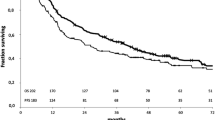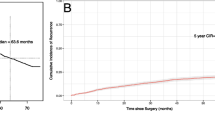Abstract
Background
This retrospective study aimed to determine prognostic factors associated with postrecurrence survival of completely resected non-small cell cancer patients with postoperative recurrence.
Methods
Characteristics, treatment modality, and postrecurrence survival of 234 patients (157 males and 77 females, mean age at recurrence: 68.7 years, 152 adenocarcinomas and 82 non-adenocarcinomas), who underwent complete resection for non-small cell lung cancer between 2003 and 2009 at our hospital and experienced recurrence, were analyzed for prognostic factors. Cox proportional hazard model was applied for multivariate analysis.
Results
Among 234 patients, the median survival time after the diagnosis of recurrence was 21 months, and the 5-year postrecurrence survival rate was 19.9 %. Eastern Cooperative Oncology Group Performance Status (ECOG PS) (hazard ratio [HR]: ECOG PS-0/PS-1/PS-2 = 1/3.313/7.622), time to recurrence after surgery (HR: >2 years/1–2 years/<1 year = 1/1.881/2.185), and number of initial recurrent organs (HR: 1 organ/2 organs/3 or more organs = 1/1.896/2.818) were independent prognostic factors. Patients who received resection or stereotactic irradiation for limited number of brain metastases or solitary extracranial metastasis, and those who received mediastinal radiation or chemoradiation for recurrence at regional lymph nodes and/or resected stump had better survival (median survival time after recurrence: 34, 64, and 25 months, respectively).
Conclusions
Poor ECOG PS, shorter time from initial surgery to recurrence, and increasing number of initial recurrent regions are associated with poor prognosis after recurrence. When the number of recurrent lesions is limited, intensive local treatment with curative intent should be applied for achieving long-term postrecurrence survival.


Similar content being viewed by others
References
Sawabata N, Miyaoka E, Asamura H, Nakanishi Y, Eguchi K, Mori M, et al. Japanese Joint Committee for Lung Cancer Registration., Japanese lung cancer registry study of 11,663 surgical cases in 2004: demographic and prognosis changes over decade. J Thorac Oncol. 2011;6:1229–35.
Williams BA, Sugimura H, Endo C, Nichols FC, Cassivi SD, Allen MS, et al. Predicting postrecurrence survival among completely resected nonsmall-cell lung cancer patients. Ann Thorac Surg. 2006;81:1021–7.
Sugimura H, Nichols FC, Yang P, Allen MS, Cassivi SD, Deschamps C, et al. Survival after recurrent nonsmall-cell lung cancer after complete pulmonary resection. Ann Thorac Surg. 2007;83:409–17.
Shimada Y, Saji H, Yoshida K, Kakihana M, Honda H, Nomura M, et al. Prognostic factors and the significance of treatment after recurrence in completely resected stage I non-small cell lung cancer. Chest. 2013;143:1626–34.
Non-Small Cell Lung Cancer Collaborative Group. Chemotherapy and supportive care versus supportive care alone for advanced non-small cell lung cancer. Cochrane Database Syst Rev. 12 May 2010:5:CD007309. doi:10.1002/14651858.
Hellman S, Weichselbaum RR. Oligometastases. J Clin Oncol. 1995;13:8–10.
Niibe Y, Hayakawa K. Oligometastases and oligo-recurrence: the new era of cancer therapy. Jpn J Clin Oncol. 2010;40:107–11.
Yano T, Haro A, Yoshida T, Morodomi Y, Ito K, Shikada Y, et al. Prognostic impact of local treatment against postoperative oligometastases in non-small cell lung cancer. J Surg Oncol. 2010;102:852–5.
Okubo K, Bando T, Miyahara R, Sakai H, Shoji T, Sonobe M, et al. Resection of pulmonary metastasis of non-small cell lung cancer. J Thorac Oncol. 2009;4:203–7.
Salah S, Tanvetyanon T, Abbasi S. Metastatectomy for extra-cranial extra-adrenal non-small cell lung cancer solitary metastases: systematic review and analysis of reported cases. Lung Cancer. 2012;75:9–14.
Kavanagh BD, McGarry RC, Timmerman RD. Extracranial radiosurgery (stereotactic body radiation therapy) for oligometastases. Semin Radiat Oncol. 2006;16:77–84.
Flannery TW, Suntharalingam M, Regine WF, Chin LS, Krasna MJ, Shehata MK, et al. Long-term survival in patients with synchronous, solitary brain metastasis from non-small-cell lung cancer treated with radiosurgery. Int J Radiat Oncol Biol Phys. 2008;72:19–23.
Kawabe T, Phi JH, Yamamoto M, Kim DG, Barfod BE, Urakawa Y. Treatment of brain metastasis from lung cancer. Prog Neurol Surg. 2012;25:148–55.
Colby TV, Noguchi M, Henshke C, Vazquez MF, Geisinger K, Yokose T, et al. Adenocarcinoma. In: Travis WD, Brambilla E, Muller-Hermelink HK, Harris CC, eds. World Health Organization classification of tumours: pathology and genetics of tumours of the lung, pleura, thymus and heart. Lyon, France: IARC Press, 2004:35–44.
Vallières E, Shepherd FA, Crowley J, Van Houtte P, Postmus PE, Carney D, et al. International Association for the Study of Lung Cancer International Staging Committee and Participating Institutions. The IASLC Lung Cancer Staging Project: proposals regarding the relevance of TNM in the pathologic staging of small cell lung cancer in the forthcoming (seventh) edition of the TNM classification for lung cancer. J Thorac Oncol. 2009;4:1049–59.
Sonobe M, Manabe T, Wada H, Tanaka F. Mutations in the epidermal growth factor receptor gene are linked to smoking-independent, lung adenocarcinoma. Brit J Cancer. 2005;93:355–63.
Antakli T, Schaefer RF, Rutherford JE, Read RC. Second primary lung cancer. Ann Thorac Surg. 1995;59:863–6.
Hoang T, Xu R, Schiller JH, Bonomi P, Johnson DH. Clinical model to predict survival in chemonaive patients with advanced non-small-cell lung cancer treated with third-generation chemotherapy regimens based on eastern cooperative oncology group data. J Clin Oncol. 2005;23:175–83.
Westeel V, Choma D, Clément F, Woronoff-Lemsi MC, Puqin JF, Dubiez A, et al. Relevance of an intensive postoperative follow-up after surgery for non-small cell lung cancer. Ann Thorac Surg. 2000;70:1185–90.
Hotta K, Sekine I, Suzuki K, Kondo H, Asamura H, Sumi M, et al. Distant failure after treatment of postoperative locoregional recurrence of non-small cell lung cancer. Thorac Cardiovasc Surg. 2003;51:283–7.
Schiller JH, Harrington D, Belani CP, Langer C, Sandler A, Krook J, et al. Comparison of four chemotherapy regimens for advanced non-small-cell lung cancer. N Engl J Med. 2002;346:92–8.
American Society of Clinical Oncology: Clinical practice guidelines for the treatment of unresectable non-small-cell lung cancer. J Clin Oncol. 1997;15:2996–3018.
Bunn PA Jr. Chemotherapy for advanced non-small-cell lung cancer: who, what, when, why? J Clin Oncol. 2002;20:23S–33S.
Walsh GL, O’Connor M, Willis KM, Milas M, Wong RS, Nesbitt JC, et al. Is follow-up of lung cancer patients after resection medically indicated and cost-effective? Ann Thorac Surg. 1995;60:1563–70.
Sonobe M, Nakagawa M, Takenaka K, Katakura H, Adachi M, Yanagihara K, et al. Influence of epidermal growth factor receptor (EGFR) gene mutations on the expression of EGFR, phosphoryl-Akt, and phosphoryl-MAPK, and on the prognosis of patients with non-small cell lung cancer. J Surg Oncol. 2007;95:63–9.
Sonobe M, Kobayashi M, Ishikawa M, Kikuchi R, Nakayama E, Takahashi T, et al. Impact of KRAS and EGFR gene mutations on recurrence and survival in patients with surgically resected lung adenocarcinomas. Ann Surg Oncol. 2012;19:S347–54.
Burt M, Wronski M, Arbit E, Galicich JH. Resection of brain metastases from non-small-cell lung carcinoma. Results of therapy. Memorial Sloan-Kettering Cancer Center Thoracic Surgical Staff. J Thorac Cardiovasc Surg. 1992;103:399–410.
Mehta M, Manon R. Are more aggressive therapies able to improve treatment of locally advanced non-small cell lung cancer: combined modality treatment? Semin Oncol. 2005;32:S25–34.
Sakamoto J, Sonobe M, Kobayashi M, Ishikawa M, Kikuchi R, Nakajima D, et al. Prognostic factors for patients in postoperative brain metastases from surgically resected non-small cell lung cancer. Int J Clin Oncol. 2014;19:50–6.
Porte H, Siat J, Guibert B, Lepimpec-Barthes F, Jancovici R, Bernard A, et al. Resection of adrenal metastases from non-small cell lung cancer: a multicenter study. Ann Thorac Surg. 2001;71:981–5.
Carey Sampson M, Katz A, Constine LS. Stereotactic body radiation therapy for extracranial oligometastases: does the sword have a double edge? Semin Radiat Oncol. 2006;16:67–76.
Bezjak A, Payne D. Radiotherapy in the management of non-small-cell lung cancer. World J Surg. 1993;17:741–50.
Aupérin A, Le Péchoux C, Rolland E, Curran WJ, Furuse K, Fournel P, et al. Meta-analysis of concomitant versus sequential radiochemotherapy in locally advanced non-small-cell lung cancer. J Clin Oncol. 2010;28:2181–90.
Acknowledgment
The authors thank the members of the Department of Respiratory Medicine, Department of Radiation Oncology and Image-Applied Therapy, Department of Therapeutic Oncology, and Department of Neurosurgery, Kyoto University Hospital for their many suggestions toward the management of patients with recurrent lung cancer. There were no funding sources supporting the work.
Disclosure
We certify that none of the authors have any commercial associations that might pose a conflict of interest in connection with the study. We affirm that this study received no external funding or any support from institutional or corporate affiliations.
Author information
Authors and Affiliations
Corresponding author
Rights and permissions
About this article
Cite this article
Sonobe, M., Yamada, T., Sato, M. et al. Identification of Subsets of Patients with Favorable Prognosis After Recurrence in Completely Resected Non-Small Cell Lung Cancer. Ann Surg Oncol 21, 2546–2554 (2014). https://doi.org/10.1245/s10434-014-3630-9
Received:
Published:
Issue Date:
DOI: https://doi.org/10.1245/s10434-014-3630-9




